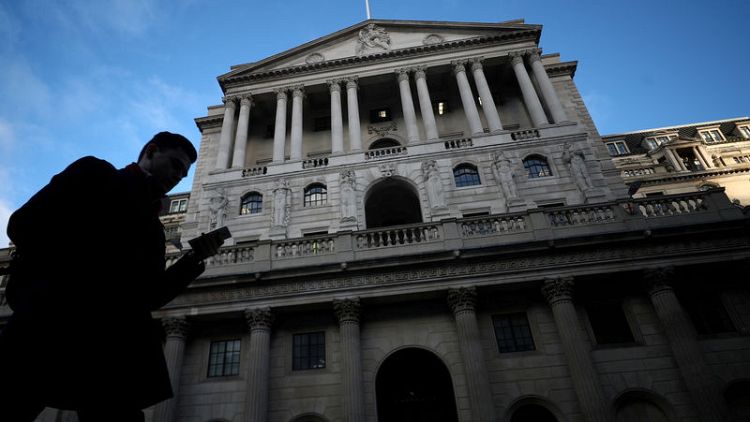By David Milliken
LONDON (Reuters) - The Bank of England is likely to push back on Thursday against investors who bet that it will follow other central banks and cut rates in the coming months, even as the risk of a messy Brexit darkens growth prospects.
Economists polled by Reuters are almost certain that the BoE's Monetary Policy Committee will vote 9-0 to keep rates on hold at 0.75%.
But it is less clear how Governor Mark Carney will tackle the challenge posed by a possible no-deal Brexit.
New Prime Minister Boris Johnson has said he will take Britain out of the European Union on Oct. 31 without a transition deal if Brussels does not rewrite the deal it hammered out with his predecessor Theresa May.
The risk of a disruptive no-deal Brexit that could push Britain into a recession means interest rate futures now price in an almost 90% chance of a 25 basis point rate cut before Carney steps down at the end of January <BOEWATCH>.
The U.S. Federal Reserve reduced its main interest rate by a quarter of a percentage point on Wednesday, and the European Central Bank is expected to take similar action next month, as both battle a slowdown driven by the U.S.-China trade conflict.
But the BoE says Britain is a special case.
Chief economist Andy Haldane highlighted last week how British rates had not risen to anything like the extent they had in the United States, while Britain's job market and inflation were much more buoyant than in the euro zone.
"We expect the BoE to ... say rates need to rise if there is a Brexit deal," Bank of America Merrill Lynch economist Robert Wood said.
Guidance about what the BoE will do if there is no deal will be less clear-cut, and may turn out to be little more than 'wait and see', Wood added.
The BoE has said a rate cut is far from automatic if there is a disorderly Brexit as a further fall in sterling -- already near a three-year low against major currencies <GBPTWI=BOEL> -- would be likely to cause a persistent inflation shock.
However, Carney and some other rate-setters have said a rate cut would be their most likely response.
FORECAST TANGLE
Normally the BoE's forecasts for inflation and growth would offer a good steer on where it sees rates going and the outlook for the economy, but this is less likely on Thursday.
In May, the BoE predicted growth of 1.5% this year and for inflation to slightly overshoot its 2% target over the next two to three years.
It also said markets were underestimating its willingness to raise rates if the economy grew as forecast.
However, with so much uncertainty about Brexit, the forecasts risk being based on contradictory assumptions.
The central bank typically bases its forecasts on official government policy -- which remains to get a Brexit deal -- even if a no-deal Brexit is a growing risk.
Yet the market prices for sterling and interest rates, as well as surveys of business confidence, all of which feed into the BoE's forecasts, reflect the risk of a no-deal Brexit.
Many economists would prefer the BoE to publish different forecasts for the economy under 'deal' and 'no deal' scenarios.
But it is more probable that the central bank, which has in the past been accused by pro-Brexit campaigners of having an anti-Brexit bias, will instead tweak the financial market assumptions that go into its forecasts.
That would be similar to its approach just before the EU referendum in 2016.
"This would allow the BoE to take account of heightened no-deal risks without being specific about them and therefore opening itself up to political criticism," Wood said.
(Reporting by David Milliken; Editing by Catherine Evans)



